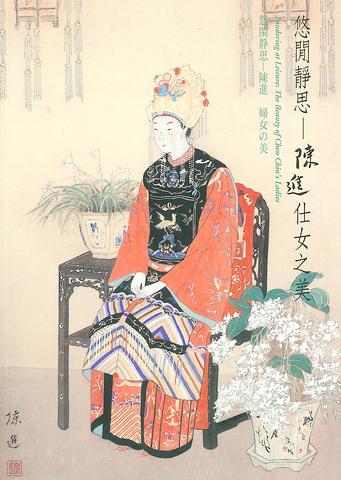Over the coming month, the National Museum of History will be showcasing a selection of works by one of Taiwan's earliest, most celebrated and influential female artists, Chen Chin (
Born in Hsinchu in 1907, Chen was the first Taiwanese female artist to study in Japan. She studied at the Tokyo Fine Arts Girls School under the guidance of some of Japan's leading artists. Even at such a young age her works were so sought after and her style so respected that critics dubbed her "the female genius of the Southern Sea."

PHOTO COURTESY OF NATIONAL MUSEUM OF HISTORY
Chen's repertoire included landscapes and still-life, but it was her portraits of ladies and her ability to transform a painting into an image that incorporated a genuine feel for the era in which they were created that was to prove her enduring legacy.
By the time she passed away in 1998, Chen had become not only one of Taiwan's most prominent and eminent artists, but her works were taking pride of place in museums and galleries throughout Europe and the Americas.
Incorporating 32 of her works dating from 1932 through 1998, The Beauty of Chen Chin's Ladies (
Beginning with Modern Lady, the exhibition takes the viewer through Chen's early unmarried days form between 1925 and 1945. Her eye for detail saw her create works that depicted both the fashions, hairstyles as well as the mannerisms and moods of young ladies of the day.
Works such as her celebrated 1936 Applying Make-up (
The latter part of the exhibition, Traditional Mother deals with Chen's works from 1945 through 1998. Here viewers see how Chen's marriage, motherhood and life as a grandmother changed her outlook on both life and art and saw her style changing in subtle yet noticeable ways.
In later works such as 1968's Fragrant Orchids (
Regardless of which chapter of Chen's life the viewer chooses to enjoy, the current exhibition gives a highly appealing overview of not only the life of one of Taiwan's foremost artists. It is also an interesting insight into the changing fashions and mannerisms of Taiwanese women as see through Chen's eyes.
The Beauty of Chen Chin's Ladies (

Jan. 5 to Jan. 11 Of the more than 3,000km of sugar railway that once criss-crossed central and southern Taiwan, just 16.1km remain in operation today. By the time Dafydd Fell began photographing the network in earnest in 1994, it was already well past its heyday. The system had been significantly cut back, leaving behind abandoned stations, rusting rolling stock and crumbling facilities. This reduction continued during the five years of his documentation, adding urgency to his task. As passenger services had already ceased by then, Fell had to wait for the sugarcane harvest season each year, which typically ran from

It’s a good thing that 2025 is over. Yes, I fully expect we will look back on the year with nostalgia, once we have experienced this year and 2027. Traditionally at New Years much discourse is devoted to discussing what happened the previous year. Let’s have a look at what didn’t happen. Many bad things did not happen. The People’s Republic of China (PRC) did not attack Taiwan. We didn’t have a massive, destructive earthquake or drought. We didn’t have a major human pandemic. No widespread unemployment or other destructive social events. Nothing serious was done about Taiwan’s swelling birth rate catastrophe.

Words of the Year are not just interesting, they are telling. They are language and attitude barometers that measure what a country sees as important. The trending vocabulary around AI last year reveals a stark divergence in what each society notices and responds to the technological shift. For the Anglosphere it’s fatigue. For China it’s ambition. For Taiwan, it’s pragmatic vigilance. In Taiwan’s annual “representative character” vote, “recall” (罷) took the top spot with over 15,000 votes, followed closely by “scam” (詐). While “recall” speaks to the island’s partisan deadlock — a year defined by legislative recall campaigns and a public exhausted

In the 2010s, the Communist Party of China (CCP) began cracking down on Christian churches. Media reports said at the time that various versions of Protestant Christianity were likely the fastest growing religions in the People’s Republic of China (PRC). The crackdown was part of a campaign that in turn was part of a larger movement to bring religion under party control. For the Protestant churches, “the government’s aim has been to force all churches into the state-controlled organization,” according to a 2023 article in Christianity Today. That piece was centered on Wang Yi (王怡), the fiery, charismatic pastor of the